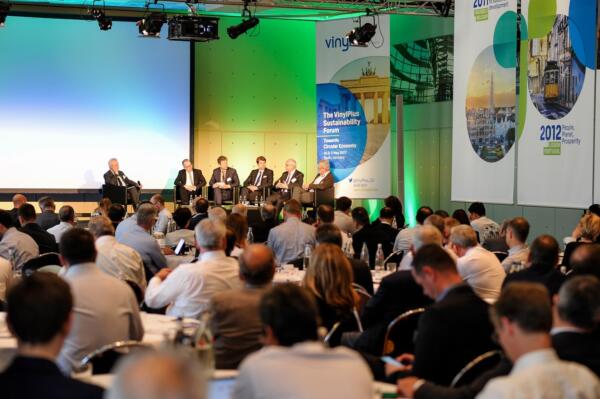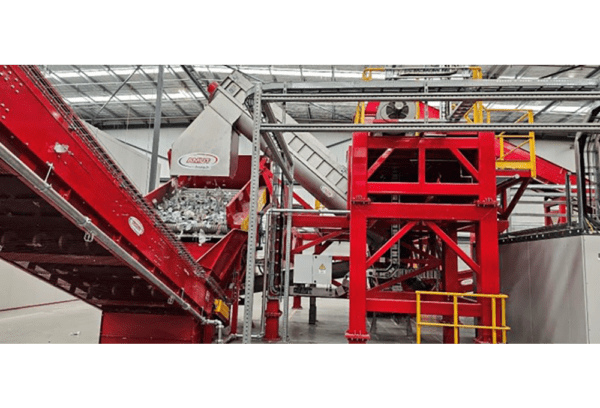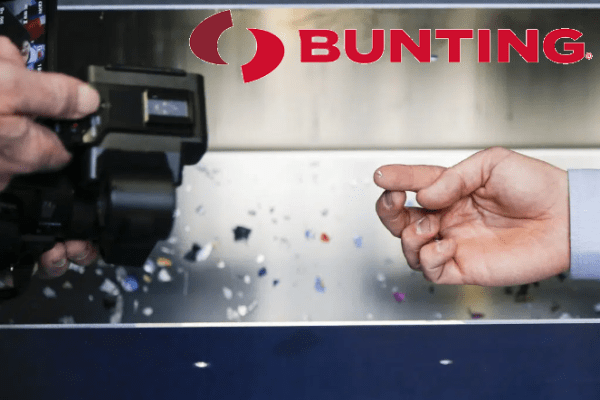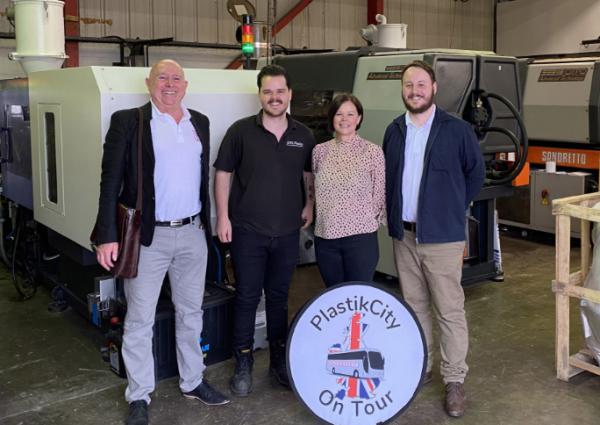
VinylPlus Sustainability Forum 2017: Towards Circular Economy
The PVC industry is making real progress towards sustainability and a positive contribution to the circular economy through a united industry approach, delegates heard at the 5th VinylPlus Sustainability Forum 2017 in Berlin, Germany.
Organised by VinylPlus, the European PVC industry sustainability programme, this year’s forum held on May 10th and 11th took the theme of ‘Towards Circular Economy’ and explored the many growing opportunities for the PVC sector to contribute to this key objective of EU policy.
Against a backdrop of important decisions being taken on the European Commission’s Circular Economy Package, presentations and panel discussions from high-level speakers focussed on how the vinyl industry is tackling key sustainability issues, such as legacy additives in recycled PVC, and contributing to a stronger circular flow of resources.
The forum attracted more than 170 stakeholders from 30 countries representing academia, government bodies, the UN, the European Commission, specifiers, designers, architects and all sectors of the PVC industry.

Welcoming delegates, VinylPlus Chairman Josef Ertl said: “The debate about how Europe can make the transition to a circular economy is placed high on the political agenda. I’m sure, most people will agree, that a sustainable society without a circular economy is difficult to imagine. And the unique characteristics of plastics allow them to make a strong contribution to a more environmentally sustainable and resource efficient Europe. PVC is clearly contributing to this; and certainly VinylPlus with its unique co-operation model, bringing together the whole PVC value chain, is the right platform for sustainability and circularity in the PVC industry.”
Acknowledging that a move from a predominantly linear to a largely circular economic system would ‘dramatically change’ how companies and value chains co-operate and the way we produce and consume goods, Josef Ertl said: “In this context, we must ensure that the entire life cycle of a product is considered, not just aspects at the end of the life cycle.”
He called on political leaders to work closely with the PVC industry to analyse the potential impacts of any decisions that might affect the PVC sector, adding: “They should ensure that the process is developing smoothly without too many frictions. We in the PVC and plastics industry will support such an approach.”
Michael Kundel, President of the European Plastics Converters (EuPC) stated that a clear way forward on how to handle end of life PVC is ‘urgently required’ if its further potential is to be exploited in the future. He called on the PVC industry and political decision-makers to ‘co-operate fully and establish a framework that meets the needs of a low carbon economy’.
He added: “The VinylPlus Voluntary Commitment has set a framework and can serve as a roadmap on how to create a more sustainable future with plastic materials along the value chain. Being the successful pioneer, VinylPlus might well serve as a role model for other plastics too.”
In his update on the Agenda 2030 and the Circular Economy, Christophe Yvetot, UNIDO Representative to the European Union United Nations Industrial Development Organization, outlined PVC’s contribution to the ‘less is more’ vision through its greater durability, longevity and recyclability in materials used in future urban developments.

Presenting the 2016 results, VinylPlus General Manager Brigitte Dero highlighted the achievements of a ‘united PVC value chain’ within the VinylPlus framework, which included the recycling of 568,696 tonnes of PVC last year. A cumulative total of more than 3.5 million tonnes of PVC has been recycled since 2000 thanks to the efforts of VinylPlus.
Progress on additives includes the development of the Additives Sustainability Footprint (ASF), a science-based methodology for assessing the sustainable use of additives in PVC products. The first ASF will be completed for window profiles this year, followed by flexible applications.
Brigitte stated: “Through the VinylPlus Voluntary Commitment, we can provide solutions to issues raised in the EU discussion on Plastics Strategy. In 2016, we made real progress towards our sustainability goals in terms of the safety and quality of recycled PVC, alongside recognition by external stakeholders that VinylPlus is considered by many as a frontrunner for the circular economy. You can find out more in our Progress Report 2017.”
Discussion also centred on Circular Economy policies, both regionally and Europe-wide and their potential impact on the plastics industry as a whole. Dr ir Werner Bosmans, EU Commission, DG Environment, updated delegates on the EU Strategy on Plastics in a Circular Economy. Cees Luttikhuizen, Senior Policy Advisor at The Netherlands Ministry of Infrastructure and Environment evaluated the impact of REACH policies for waste and the circular economy.
Two keynote speeches from Norbert Kurilla, State Secretary at the Slovak Ministry of Environment and Dr Alexander Janz from the German Federal Ministry for Environment highlighted best practice and developments towards a circular economy in their respective countries.
Dr Janz said: “The many possible uses of plastics have made them an integral part of our daily lives. It is precisely for that reason that, now more than ever, we have to strengthen the sustainable management of plastics along the entire value chain and in doing so reduce negative effects on the environment and human health.”
Reflecting on the Forum, Josef Ertl concluded: “Innovation is the main driver which creates ways to reduce emissions and consumption of raw materials and resources. It improves energy and cost efficiency, it increases products’ useful lives. It will create a lot of new ways to improve recycling. Through the VinylPlus Voluntary Commitment, with the entire value chain, we contribute to overcoming the challenges faced in a circular economy.”
VinylPlus is the Voluntary Commitment of the European PVC industry. The programme establishes a long-term framework for the sustainable development of the PVC industry by tackling a number of critical challenges in the EU-28, Norway and Switzerland.
More information on the 2017 Forum can be found at http://vinylplus.eu/community/vinyl-sustainability-forum/vsf-2017. More information on the Progress Report 2017 can be found at http://www.vinylplus.eu/documents//57





